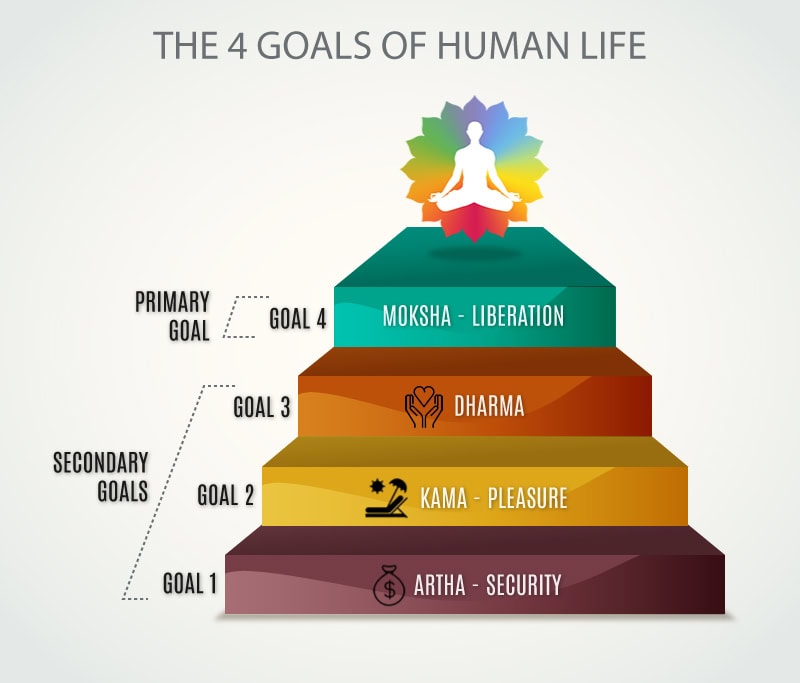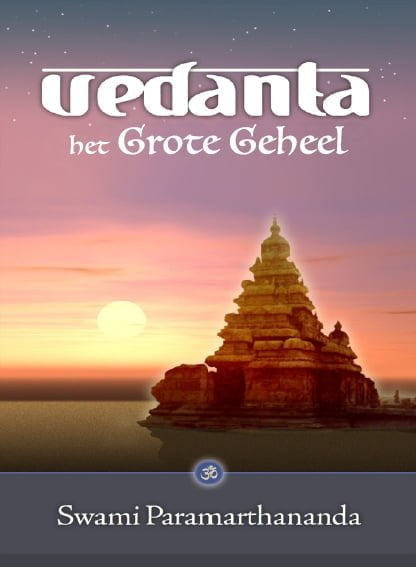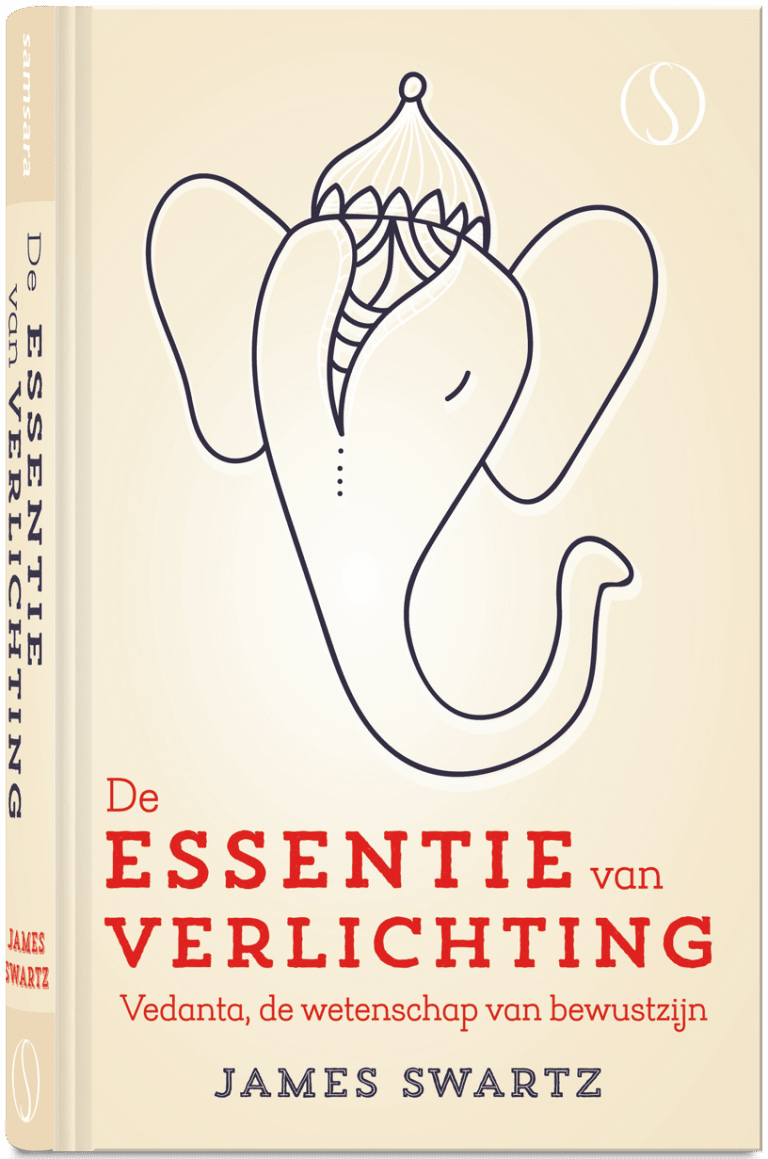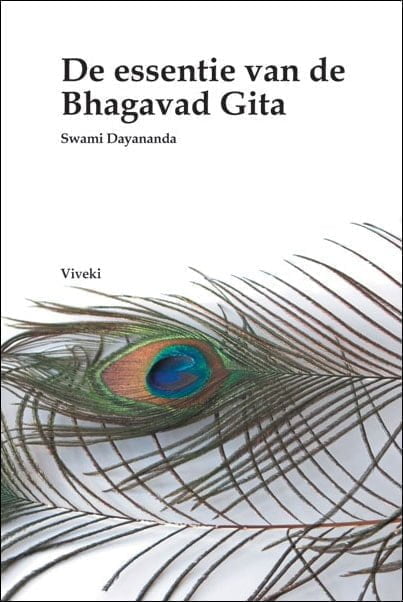A Path to Liberation
Vedanta is a way to really get to know yourself. To recognize what you are in essence. What is meant by yourself here? Is it the combination of your outer life and your inner life, of your body, your character and your personality? Or is the Self that you are in essence something else, a Self that is free from the limitations of your personality and character, from your traits, judgments and conditioning, from thoughts and feelings, from your outer form and the life you lead.
To know that Self, that is what Vedanta is all about. There are many names for it: Enlightenment, God, Liberation, Moksha, Awakening, Self-realization, Oneness, Brahman, Nirvana, Consciousness, Awareness, Ultimate Reality, the Unnameable, the Absolute, the Infinite to name a few.
In Vedanta the realization of this is considered the highest goal in human life. And that does not mean the belief that such a thing exists, but the actual understanding, knowing and experiencing it. You want to know instead of believing. That is Self-knowledge in its purest form. Non-dual knowledge, with which you understand not only yourself -that which you are in essence- but also the essence of all existence, nature, man and the universe. And with it the origin of it all.
Not what it seems
All objects that you see, hear, taste, smell and feel consist of particles. Objects and bodies, air and water, but also planets and stars consist of molecules. These in turn consist of atoms, protons and they consist of even smaller particles. The smallest particles appear to consist only of energy. And that actually turns out to be no more than information or intelligence, which in turn consists of pure Consciousness, formless and unlimited. Energy or matter is therefore carried by Consciousness from which the entire universe manifests itself. There is no matter at this level, only Consciousness, infinite in its mind-boggling and dizzying possibilities for creation.
Vedanta gives a very fascinating explanation about this. How from Consciousness the whole universe can seemingly arise. (Origin here means: it temporarily takes on names and forms, but does not really change. Hence, everything is temporary and transient.) How Consciousness shines on the creative force, Maya, through which all forms appear. How we humans give a name to all forms. How we no longer know our origins, are identified with our form, are mesmerized by all forms of life and are subject to many limitations. How we live in a split and no longer know the unity of the whole. How we see ourselves as the center and are separate from the whole. How the reality of what we are in essence seems to be veiled and hidden from us.
Vedanta gives us the knowledge of how to see through that veil and how to discover what our true nature is. Vedanta is a method of knowledge that enables us to know as a unity what we consider to be a multiple, dual, reality. To understand what and who we really are. To bring about a shift in perspective from separateness to the unity of consciousness. To live from unity and to act from there. And that not from a temporary experience or enlightenment, but as permanent Being. That is what is called “Moksha” in Vedanta: the highest freedom.

What do I actually want?
In Vedanta there are four human goals mentioned:
1. Artha (Safety and Security)
2. Kama (Fun and Enjoyment)
3. Dharma (Doing Good and Social Commitment)
4. Moksha (Liberation)
Artha stands for all forms of security in life: a roof over your head, enough money, but also wealth, power, influence and fame. When the basic needs are met, the attention automatically goes to the next goal: Kama. You also want to have a nice life, preferably with a lot of fun. Kama stands for all forms of sensory pleasure.
There is a possibility that you cannot get enough of the first two goals and that you spend all your life energy on getting more and more. But if you realize that more and more for yourself and your loved ones cannot really make you happy, Dharma plays a role as a goal in your life. You want to share and give your qualities back to society. Dharma is about the right way of life, in which you don’t just live for yourself. That results in “good” karma. Good karma, which is necessary to be able to take the next step.
I’m never done
With the first three goals, you live object-oriented, outward-looking. For many people, that is enough. Your own life can be very beautiful. Especially if you are also committed to society and do not close your eyes to other people’s suffering. Your life can be such a beautiful prison that you don’t even realize you’re trapped. That you mop while the tap is open.
Ignorance is the cause of all misery in the human world, because people start to compensate for their sense of limitation with unbridled pursuit of wealth, material possessions, sex, power, etc. Knowing who and what you are is the solution, and that starts… with yourself!
Dedicating oneself to others, society and/or nature and the earth is also an object-oriented goal. Good and necessary to be involved with. But it is not a solution to the fundamental problem, the ignorance of who and what we are. The moment you ask yourself what everything is for and what the meaning of your life is, you start searching and hopefully you will find a way to look at reality radically differently. You will realize how limited and unfree you actually are and recognize that you no longer long for more security, pleasure or doing good, but for freedom from all desires that bind you, freedom from the feeling of insecurity and limitation. Freedom of control and the feeling of being responsible for world events.
The highest goal, Moksha, is what your desire is for more and more.
Moksha, not a philosophy but means to freedom
Moksha is freedom, freedom from attachment to Artha, Kama and Dharma. The pursuit of the first three goals is based on the feeling of “I am insecure, I need something, I am not happy, I am mortal, I have to become someone.” I always have to make sure that what I think I need from the outside to be happy is sufficiently present in my life. I have to fulfill my urge to become better than what I think I am now.
You have to realize that simply adding more Artha, Kama, and Dharma will not change your basic sense of limitation. It will never be enough and you will keep coming up against new limitations. Trust is the first key to calm and happiness. From Vedanta you can learn why you can fully rely on existence. Next, Vedanta is a proven way to find real freedom, a freedom that, once you have tasted it, you will not let go.
Just bite the bullet
Because Vedanta comes from ancient Indian wisdom, many Sanskrit words are used. This seems difficult at first, but usually the terms are well explained and you get used to them. In our Western languages, there are simply fewer words to explain the knowledge of reality in a nuanced way. This knowledge is many thousands of years old and has been passed on from century to century, in many scriptures and orally from teacher (guru) to student. These ancient scriptures are the Vedas, the Upanishads and the stories such as the Bhagavad Gita. It contains an incredible amount of valuable knowledge that has also proven its practical usefulness in our time. Vedanta is a proven way to achieve Enlightenment through knowledge transfer. With cognitive knowledge you can see through Maya’s delusion. After that, through exposure to the texts and knowledge of Vedanta you can understand more and more. At a certain point, the truth of your full Self dawns on you like lightning. From that moment on, everything is different!
That does not mean that the first three goals are no longer important. However, the need for more and more is disappearing. Life is no longer the pursuit of happiness, but the celebration of your happiness.
A Living Teacher Makes the Truth Alive,
Because of Maya’s illusionary effect, it is difficult to see what it is all about, especially in the beginning. This knowledge initially goes against human logic and intuition. In earlier times, therefore, it was necessary to find a teacher and to stay with him for a long time. In our time with the internet and so many sources, you can come a long way through self-study. Many Vedanta teachers can be found on YouTube. These can be found on the page with Links and in the Blog. You can also form a relationship with a teacher by participating in online meetings, which is recommended for a variety of reasons. In addition, there is the possibility to participate in short-term seminars, either here or in India. For example with Andre Vas, James Swartz or Rommert van Dijk. It is important not to do it all by yourself by just reading texts. Probably the subtle meaning will remain inaccessible and the texts will seem boring and incomprehensible.
To get an overview, you can start with one of the books below. In particular, the small book “Vedanta, the Great Whole” is very suitable for this. You can also do the course that is listed below in “Further deepening”. At the moment only in English, but a translation is being worked on.
In the article “What is non-duality” by Simon de Jong, Vedanta knowledge is further explored.
Vedanta versus other forms of spirituality.
Vedanta, also called Advaita-Vedanta, is one of the traditional sources to achieve Enlightenment. A source that has its roots in India. Vedanta is no better than other spiritual or religious movements. It is just what you are attracted to and in the beginning of your search it can be useful to make a broad orientation of it. Ultimately, it makes sense to explore in depth what you are most attracted to and what came your way. If you are looking for water, you will not find it by digging shallow wells in many places. By concentrating on one location and going into depth there, you can find what you are looking for.
Good luck!
For further deepening
- Vedanta Basic Course (English only)
This link refers to a Vedanta Basic Course designed for people who want to know more about Vedanta and get a good overview of it. - What is non-duality?
In this article, Simon de Jong takes a closer look at this question. - Welcome to the timeless wisdom of Advaita Vedanta.
English translation of the homepage of the website of Andre Vas, YesVedanta.
What does Vedanta mean to you?

Vedanta wijst je de weg naar innerlijke vrijheid.
Vedanta is niet iets dat je aanhangt of waar je in gelooft. Vedanta is als een wegwijzer of gids.
Het is een unieke manier van zelfonderzoek, die je helpt om je innerlijke vrijheid zelf te ontdekken. Vedanta laat je inzien dat je, als gevolg van universele misverstanden of onwetendheid, leeft in een subjectieve versie van de werkelijkheid.
Vedanta ontsluiert die onwetendheid door je inzicht te geven in de samenhang tussen je subjectieve, objectieve en ultieme werkelijkheid. Om met andere ogen te leren kijken naar je dagelijkse werkelijkheid. Want “wat werkelijk is” blijkt niet te zijn wat je altijd hebt aangenomen!
Haar methodische aanpak wordt al millennia doorgegeven aan nieuwe generaties via de Vedische geschriften en leraren. Vedanta vraagt van je om:
- te luisteren ( snap je wat gezegd wordt?)
- te reflecteren (opnieuw kijken naar wat je ervaart, twijfels bespreken)
- te mediteren (zodat kennis transformeert in weten)
Met als doel om de wijsheden die we allemaal wel gehoord hebben, je ook letterlijk eigen te maken. En te ontdekken dat jouw dagelijkse - en spirituele leven gewoon een zijn. En je leert loslaten wat je verhindert om je innerlijke vrijheid te ervaren. Nu, precies waar je bent.

Voor mij vielen alle pogingen die ik deed om iets te vinden waarvan ik niet wist wat ik zocht weg. Het zogenaamde kwartje viel en het zoeken stopte!
Wat een rust te weten dat ik het gezochte Ben.
En de veiligheid van de traditie te hebben. Te horen wat je wel kunt doen.
Struktuur die aangebracht wordt, niet meer oeverloos ronddobberen van ervaring naar ervaring.
Ik dank God op mijn blote knieen dat Vedanta op mijn pad kwam.

Dan publiceren wij dat hier. Stuur je antwoord in een mail naar redactie@vedanta.nl

Vedanta, the Big Picture
This concise booklet gives a good overview of Vedanta and the conceptual framework that is used.
Download the Epub and PDF and/or order the booklet as a pocket (11×18 cm, 116 pages) for €15

The Essence of Enlightenment
by James Swartz
Videos with English and Dutch subtitles
You can find it here on this website.
Website: www.shiningworld.com
On this website you will find a lot of information, books, audio and video material about Vedanta.

The Essence of Enlightenment
by James Swartz, the translation of the book above, is also available in Dutch.
Website: Publisher: Samsara

Publisher Viveki has translated and published many books about Vedanta in Dutch, including The Essence of the Bhagavad Gita, with explanations by Swami Dayananda.
Website: www.viveki.nl